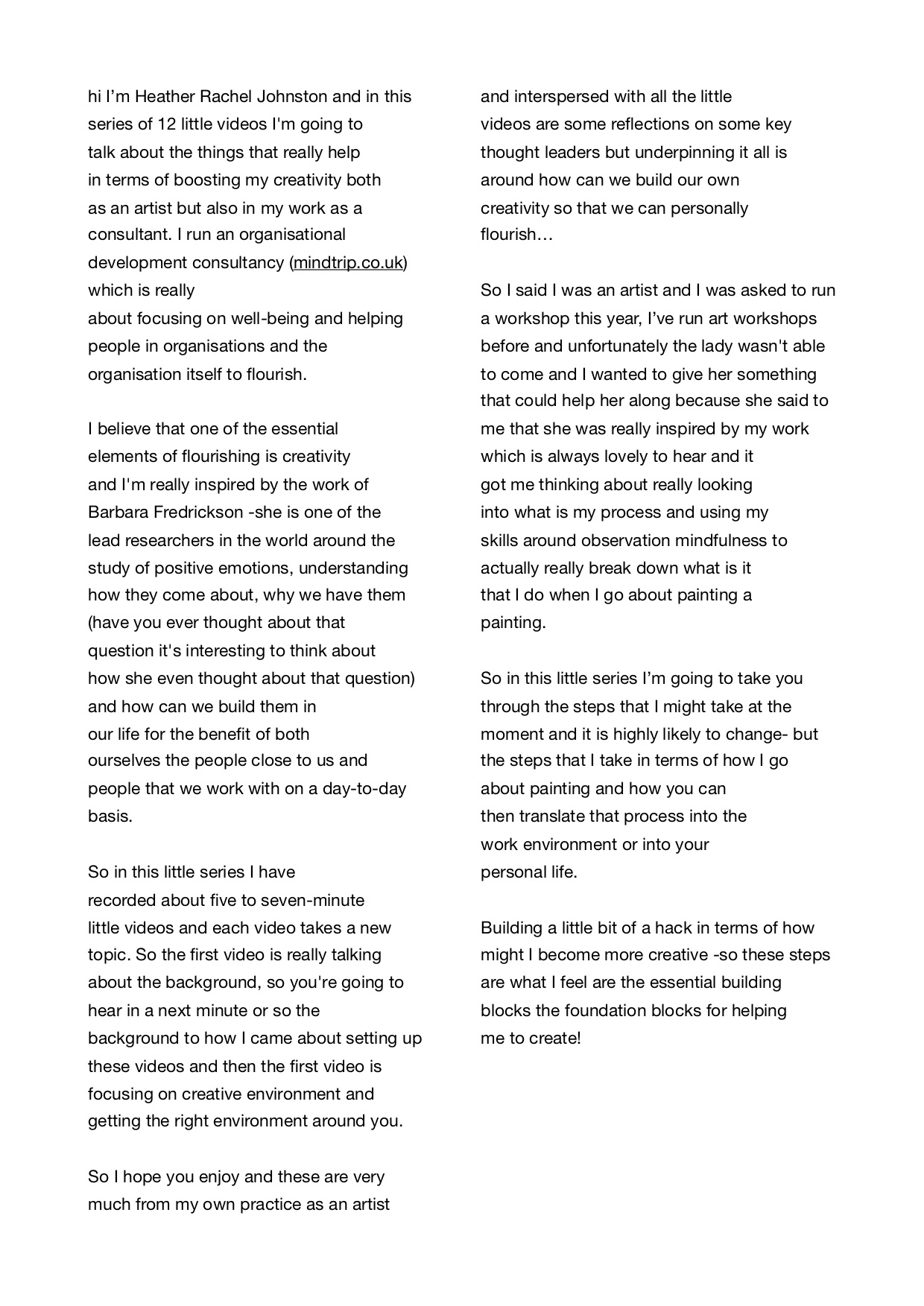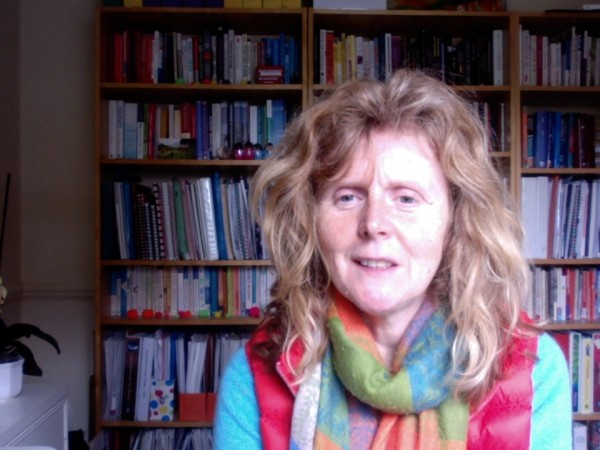COMING SOON! SIGN UP TO GET IN EARLY…
Join me for my 12 day creativity challenge hack. Each day find in your inbox a short 5 minute video of the 12 hacks that help me be creative that you can apply to your life and work

Cass Sunstein brought the concept of a nudge to the world and is a key thought leader in behavioural economics which is ‘a method of economic analysis that applies psychological insights into human behaviour to explain economic decision-making’. Working in the area of change i am fascinated between the crossover of economics (my first degree) into applied psychology (my profession) and vice versa to inform behavioural change.
I’ve been doing a deep dive into some of the recent presentations from the 2019 behavioural exchange conference hosted by the Behavioural Insights Team who are a leader in applying behavioural insights for the benefit of people and communities…I found the presentation by Cass Sunstein thought provoking and made me reflect around how we go about organisational development, change and business transformation. Read more
Hear from Hannah, the Director of HR, about what we have been up to, to grow happiness and wellbeing amongst the staff at Perrywood, an award winning garden centre based in Essex and Suffolk. Always great to hear from a happy client!
If you would be interested to find out more about how I can help you with workplace happiness at your business (Perrwood is an SME with 200 staff) then drop me a line Hello@mindtrip.co.uk
Your emotions count!
“If you experience a healthy dose of positivity and you can sustain it, it can also empower and energize you to deal with adversity in a more constructive way. In that sense, resilience and a positive outlook are highly intertwined. If we cultivate our ability to sustain positivity, we are simultaneously cultivating our ability to bounce back from negativity.”
-Pelin Kesebir ( Centre for Healthy minds)
Latest research from the centre of healthy minds run by Richard Davidson builds on his fascinating book the emotional life of your brain. In the book he talks about the links between our emotions (our affect) and our wellbeing. Much of mainstream mindfulness focuses more towards the focus element of mindfulness and our ability to manage our attention. What I love about Richie Davidson’s work is that it focuses on our emotions too and importantly the study of what sustains psychological wellbeing rather than purely focusing on disorders and when things go wrong.
mindtrip reflections of ideas, thoughts, hints and tips and book recommendations focused around building a flourishing work environment.
Here are some of my thoughts and reflections of the link between creativity and wellbeing and the essential elements that boost my creativity. These were the early days of me recording videos and i wouldn’t do it the same way again..but you get the idea 🙂 They came about through observing what the steps are in my art practice and how this could be related more generally to kick starting creativity…I talk about researchers that have inspired me, the link between creativity and wellbeing and the importance of mindfulness, self compassion and play. Each video is between 4 and 7 minutes…and they were unscripted apart from the the overall topic!
Click on the top right of the box to navigate through the videos in this series!
Thinking about earning some money on the side? Whatever your reason for taking out a side hustle, you are not alone! Burgeoning in the States and building here with the disruption caused by new technology enabled business models it might just be that that hobby of yours, that passion around wellbeing or your love of travel may in fact enable you to earn a bit of cash on the side. Generally the focus on a side hustle is to make some money out of doing something you love in addition to your current work or you may have come up with an idea or disruption all of your own to add a bit of variety to your life. The following article gives you a little bit to think about.. Read more
If you look back over your career what have you noticed about the technological impact on how you do your job? What we have experienced over the last few decades is predicted to ramp exponentially and the new norm will be just in time learning, upskilling, flexibility and adaptability. For some of us this will hit our sweet spot for others it will create much anxiety and fear. This article is a deep dive into how organisations may go about upskilling their workforce to remain viable, productive and desirable to their staff and customers.
While focused on digital upskilling, wider thought needs to be given to how to parallel this with people’s comfort and abilities in the areas of dealing with change, resilience, creativity, and empathy/compassion.
And finally, from a wellbeing, healthy organisation and society perspective much research has been done by Professor Richard Layard and colleagues on the huge personal costs to individuals of being made unemployed.
Access the article here
Great article focused on how to help yourself to develop a change resilient mindset
G- adopt a growth mindset eg this may feel uncomfortable for a while but I will learn and grow through making this change
P- link the change or transition to something purposeful or has meaning to you eg by sticking this out it helps me to build the lifestyle I want to live, help others or wider Society
S- Make it social or get support from others to help you navigate change eg work with a coach, a mentor or others that may have experienced or are going through similar changes
Help Students Navigate Life’s Transitions With a Mindset GPS
Working as an executive coach and an organisational development consultant these questions come up again and again. What do we value? What does success look like? How come what I used to love I don’t anymore- what next? What type of success drives me and why…Where should we be as a business? Why? How can we stop falling out as a team? How can I raise staff wellbeing?
In our lives and work we are driven innately by what we value and the social context of what is around us. We may also be being influenced by our bodies’ and minds’ automatic wiring, pushing us towards and away from things and people that we desire and avoid. We react, make decisions and lead our lives by these implicit rules and behaviours. This is us on automatic pilot– our own personal intelligence that helps and guides us through life, so that we don’t have to stop and think every second to appraise what might be best.
It is a complex web and who you talk to will focus on a different element of that web- driven by what is important or makes sense to them. Very simply, social psychologists and behavioural scientists may tell you that actually you have little agency and that your behaviour is determined by the context that you work and live within- social comparison and a desire to belong within groups being at play. Other specialisms of psychology will focus perhaps more on the individual level, your own personality perhaps, or common themes among people seeking out life satisfaction. Philosophers will come again at another angle exploring how do we know what is important to us? Challenging us to think about what matters and what doesn’t and why.
So I invite you to consider a couple of things:
You may in fact be being driven by your social context and not actually what makes you happy…do your really want that degree, get married, promotion etc For a challenging look at these social memes that may be guiding you I invite you to read Paul Dolan’s latest book and have a look at this MOOC
Have you stopped to consider what really matters to you? What are your personal indicators for a good life? The fields of positive psychology and wellbeing try and measure this area using indicators such as satisfaction with life and psychological wellbeing. Looking at your own personal balance between eudaimonia (flourishing/fulfilling our potential) or what is purposeful to us and what makes us feel happy in the moment -our own personal pleasure (with thanks to Paul Dolan).
For some of us that are in the lucky position to have moved beyond pure survival, pleasure may be our key driver for others success and a good life is more about realising our potential, learning, growing and challenging ourselves. What is your balance? To explore this further I invite you to start being your own personal investigator- noticing in the moment when you feel good and not so good- is it when your ‘think’ you ‘should’ feel good, perhaps having a go at this self test for a few days. If you are struggling with a lack or purpose or meaning have a go at the test above and reflect on what is really important to you in your life? What challenge, change, learning or area of growth would bring you more fulfilment and/or what contexts (hobbies, workplace, communities) would support and enable this?
Interested in exploring this further both individually or as an organisation? Drop me a line hello@mindtrip.co.uk
More and more attention is beginning to be paid to wellbeing initiatives at work. Moving from just focusing on ad hoc events to looking at wellbeing as a strategic foundation to build a business up from. Taking key policies, processes and initiatives and putting them through a wellbeing lens.
Typically people then will ask what about ROI, productivity and economic and profitability impact. However I would advocate that as we move into the 2020s the imperative will and should be more around humanity and humane business practices. Building businesses that make a difference and don’t cause untold suffering to human lives.
So it is also good to see a new research report that also is beginning to build the economic case – particularly if you work in finance and retail.
It also shows a strong correlation between employee satisfaction, customer loyalty, productivity and profitability. What’s not to like?
Interested in undertaking a strategic wellbeing health check in your workplace? Do get in touch hello@mindtrip.co.uk 07801 246113






